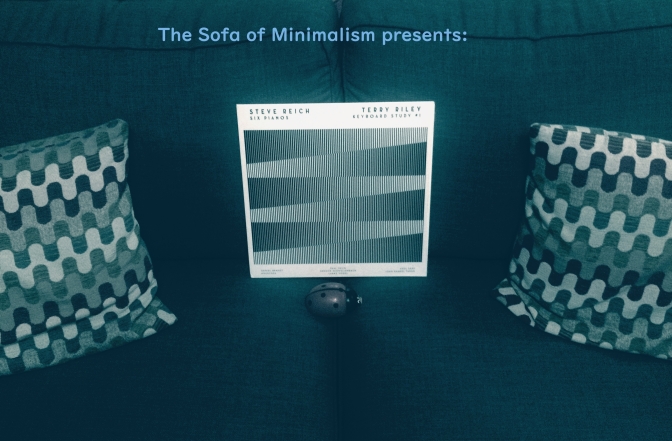
Everything the same, everything different. Steve Reich Six Pianos.
The pianos, six of them, clatter out the same pattern of notes for over 22 minutes. I find the sound absolutely transfixes me, pins me down, until I become so used to the sound I can no longer hear it properly; which is when the genius happens.
Tiny variations start to make themselves heard, something subtle at first – a certain change of emphasis on a note, maybe a drop off in the number of pianos heard, later there are minute incremental changes in the phasing of the instruments, so that everything warps very slowly. Mechanical minimal as it is after hearing it long enough it sounds like the most natural thing of all, water.
The overall effect when one piano really does start to play something different around the 8-minute mark is radical enough to make me want to leap up out of my seat, because it delivers the one thing your brain has been craving – progression, narrative. I have never before encountered music that plays with my cerebellum to this extent.
Like watching a plant grow the changes happen at such a glacial speed that they barely register. By the end of the piece though everything has changed, everything is in a state of flux and nothing has changed at all.
Everything the same, everything different.
Recorded in honour of Steve Reich’s 80th birthday in 2016 I was lucky enough to pick up a copy of this record on a complete impulse buy in Liverpool’s mighty Probe Records one lunchtime. My son* hipped me to Steve Reich when he was studying his Electric Counterpoint (played by Pat Metheny) at school, which Mrs 1537 and I absolutely loved.
The LP is on Film Records and recorded by 6 German pianists** in different parts of Germany and then edited together. The only member of the sextet I knew of previously is Hauschka, who I think of as something of an ambient/classical musician based out of Düsseldorf. I have since sampled a good few other recordings of ‘Six Pianos’ and in terms of precision and clarity this is by far the superior recording.
Oh, there’s a B-side too – Terry Riley Keyboard Study #1, the first few seconds of which will be very familiar to any Who fans in the (life)house^. Recorded solely by Gregor Schwellenbach and edited by Lukas Vogel, this is a much busier piece than ‘Six Pianos’.
Whereas ‘Six Pianos’ clockwork minimalism marches, Riley’s work has more of a swirl to it, it’s more frantic – the looping repetitions of phrases played against each other, giving a more frenetic, faster rate of harmonic change, a more urban experience, maybe, there is no sound of water here.
What ‘Keyboard Study #1’ brings to mind is the fact that the piano itself is not a directly played instrument but more of a machine – you don’t directly blow into it, beat it, or strum it, you hit a key which in turn by means of some mechanical jiggery-pokery-thingy-hoys a hammer strikes a string. I sense this slight remove from the means of production in this piece, it is a colder and shinier form of minimalism at play here.
I struggle to describe the music on Six Pianos / Keyboard Study #1 better than the geometric cover already does, the intersecting lines of the patterns, separation and integration of shapes and command of available space. Damn, so that’s how LP covers work!
Everything the same, everything different. And so on.
837 Down.
*who has rebelled against his parents by becoming a classical buff.
**say that last bit out loud for a giggle, if you are as childish as I am.
^’Baba O’Riley’ even borrowed his name as a tip of the hat to one of Townshend’s heroes.
